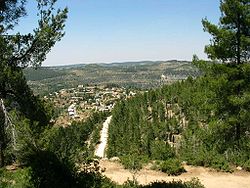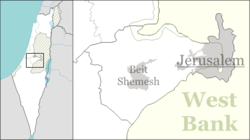This is an old revision of this page, as edited by Zero0000 (talk | contribs) at 06:57, 10 January 2021 (reduce excessive coords precision). The present address (URL) is a permanent link to this revision, which may differ significantly from the current revision.
Revision as of 06:57, 10 January 2021 by Zero0000 (talk | contribs) (reduce excessive coords precision)(diff) ← Previous revision | Latest revision (diff) | Newer revision → (diff) Place in Jerusalem, Israel| Even Sapir
אבן ספיר إيفن سابير | |
|---|---|
 | |
 | |
| Coordinates: 31°45′47″N 35°8′5″E / 31.76306°N 35.13472°E / 31.76306; 35.13472 | |
| Country | Israel |
| District | Jerusalem |
| Council | Mateh Yehuda |
| Affiliation | Moshavim Movement |
| Founded | 1950 |
| Founded by | Kurdish immigrants |
| Population | 699 |
Even Sapir (Template:Lang-he, lit. Sapphire) is a moshav in central Israel. Located on the outskirts of Jerusalem, it falls under the jurisdiction of Mateh Yehuda Regional Council. In 2022 it had a population of 699.
History
Even Sapir was established in 1949 on land that had belonged to the depopulated Palestinian village of 'Ayn Karim.
The moshav was founded by Hebrew repatriants returning from Kurdistan. The name was either taken from Even Sapir, a book written in 1864 by Yaakov Halevi Sapir, a Jerusalem rabbi and emissary, which describes his travels to Yemen in the 19th century, or it was named after Pinchas Sapir, Israel's finance minister, who encouraged Jewish businessmen from the Diaspora to invest in Palestine and the nascent state.
To the north of the moshav is the Monastery of St. John in the Wilderness and a cave attributed to John the Baptist.
Even Sapir is one end point of the Jerusalem Trail, a 42-kilometer walking route around and through Jerusalem, which intersects with the Israel National Trail. The point of intersection is just outside Even Sapir at the Ein Hindak spring.
Even Sapir is a home to "Ben Gurion Institute of Science & Technology", Jerusalem Campus, a housing estate designated for 430 local and international students.
References
- ^ "Regional Statistics". Israel Central Bureau of Statistics. Retrieved 21 March 2024.
- Khalidi, W. (1992). All That Remains: The Palestinian Villages Occupied and Depopulated by Israel in 1948. Washington D.C.: Institute for Palestine Studies. p. 273. ISBN 0-88728-224-5.
- HaReuveni, Immanuel (1999). Lexicon of the Land of Israel (in Hebrew). Miskal - Yedioth Ahronoth Books and Chemed Books. p. 19. ISBN 965-448-413-7.
- A Journey to Teman
- Judean mountains Esra Magazine
- Go with the flow, Jerusalem Post
- Jerusalem Trail
- "BGIST". Archived from the original on 2012-04-26. Retrieved 2011-12-20.